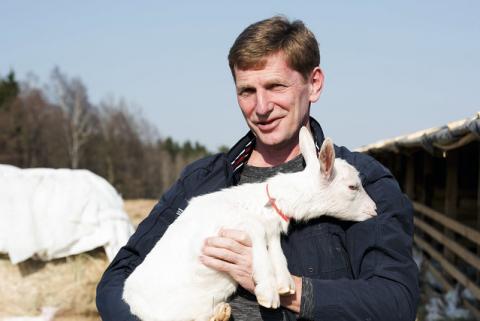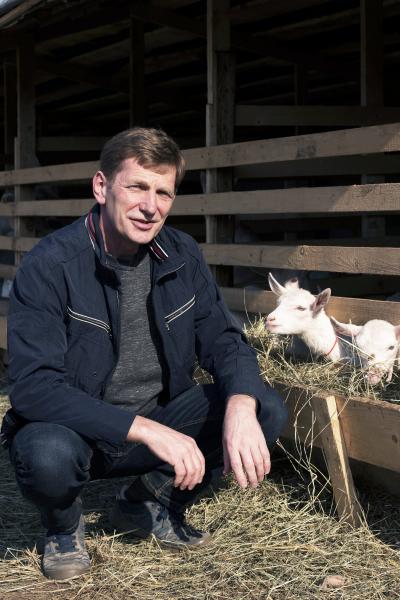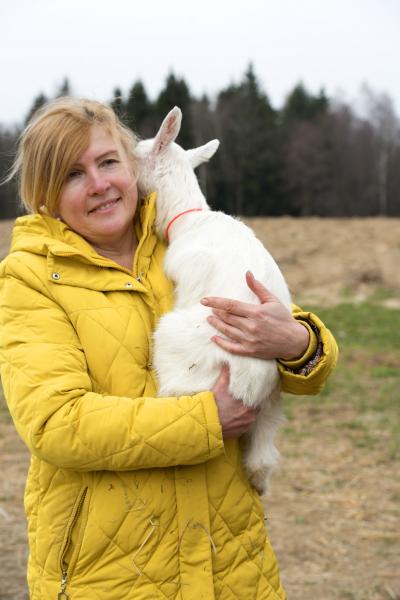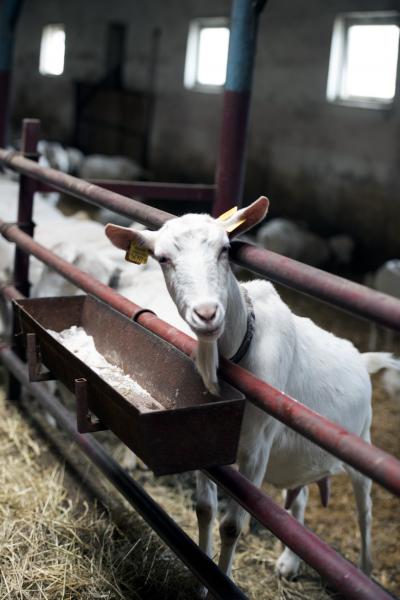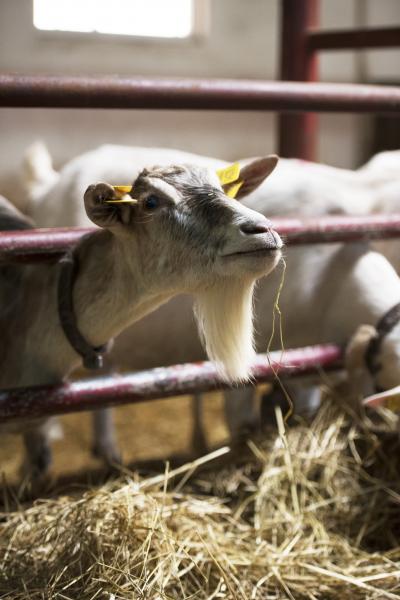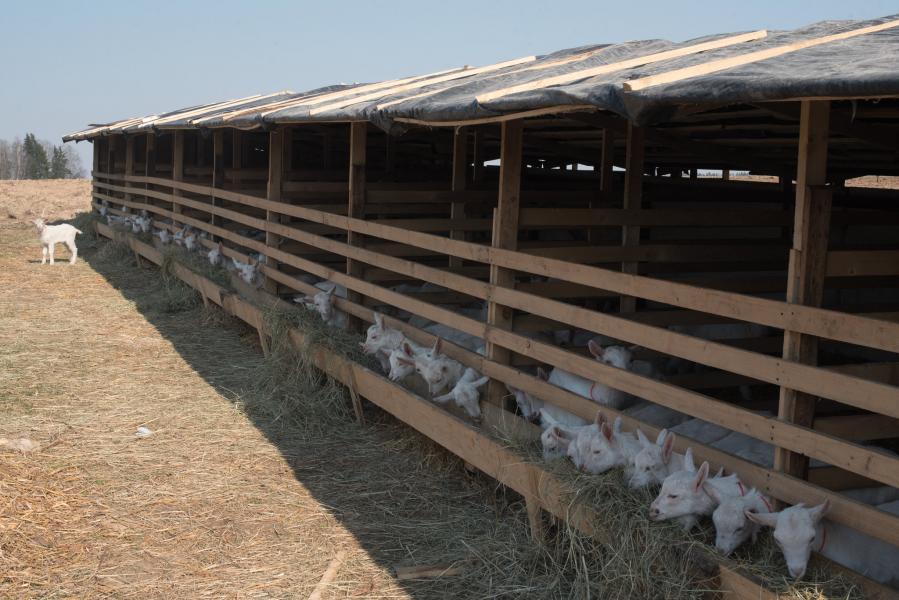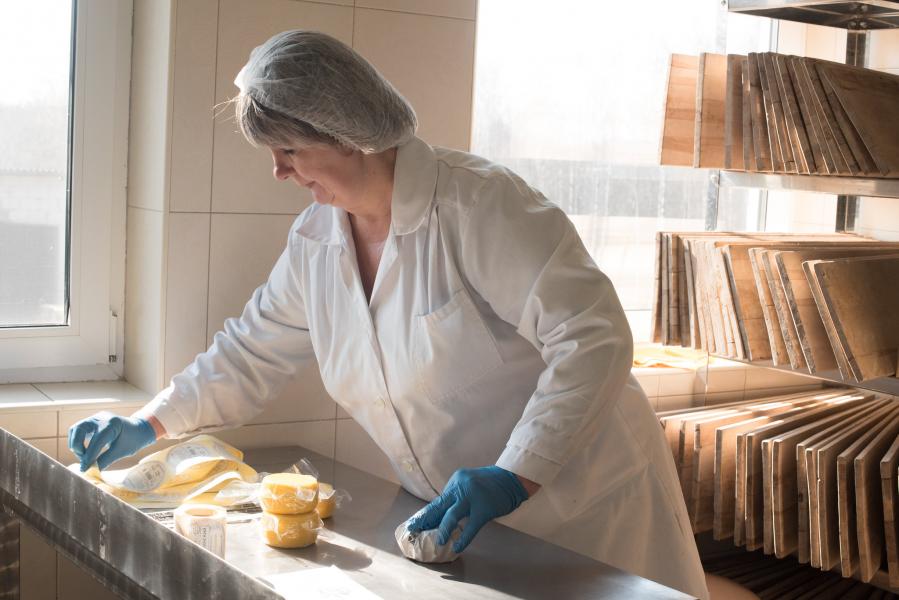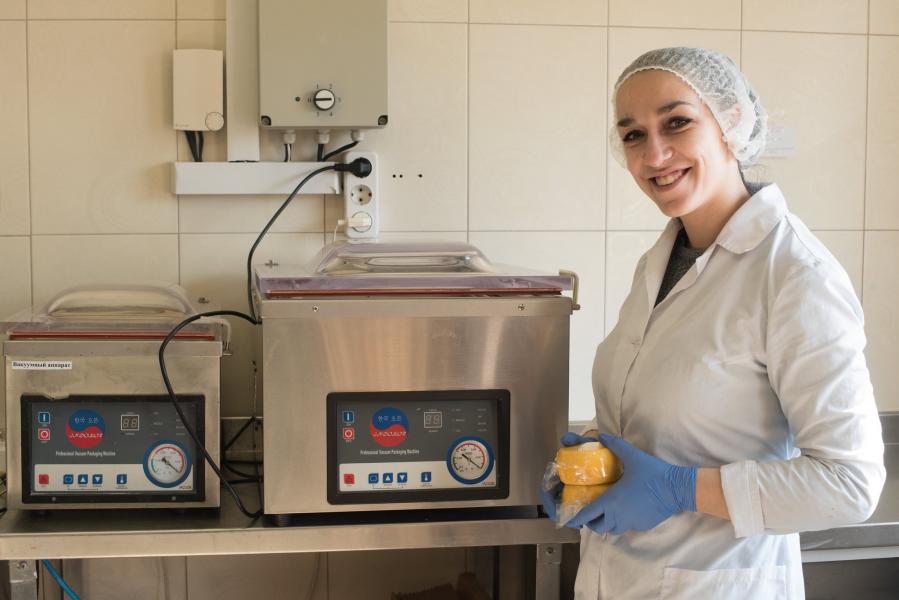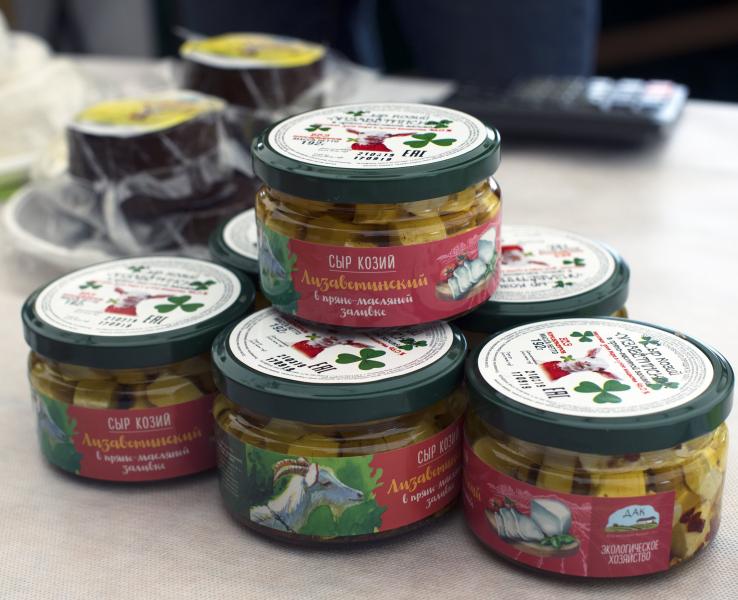When planning for the future of a business, it is important to rely on qualified marketing research and unbiased specialist opinion. This is what Dzmitry Krylou, the owner of DAK farm, the only breeding goat farm in Belarus, was looking for when he applied to the ‘Advice for Small Businesses’ programme implemented by the European Bank for Reconstruction and Development (EBRD) as part of the EU4Business initiative, funded by the European Union.
As a result of this cooperation, Dzmitry decided to expand the farm twice, engaging in a project that is revolutionary, not only for Belarus, but for the whole region. But first, a little background information.
It all began with cabbages
DAK farm, located near the town of Fanipal (Derzhinsky district, Minsk region) is unique. Dzmitry Krylou, an engineer by training and an innovative entrepreneur by vocation, and his wife Halina decided to go down the path of farming in the late 1990s. After several years trying to break into the market, they finally found their own niche in 2004, building up the goat farm and beginning to supply an exclusive product to their first clients.
Today, DAK produces delicious goat cheese using 12th century recipes, as well as yogurts and whey, which can be ordered via its website, or found on the shelves of the largest Belarusian chain stores.
However, its owners had to go a long way before establishing a 1,000-strong goat-breeding farm employing 20 people. It all started with them cultivating various vegetables, including cabbage. Later they switched to pig breeding, but couldn’t compete against cheaper imports and failed to break into the market. The farmers did not give up, however: they did their research and realised that there was a niche for the production of goat’s milk in Belarus. In 2004, inspired by this new idea, they sold their remaining pigs and began buying goats from local people. Since they had no experience at all, only 12 out of 80 animals survived the winter, and it became clear that they had to start taking the breeding process seriously in order to succeed. In 2006, they bought their first Saanen goats, the most productive breed in the world, in Latvia. At first, the farmers wanted to send the milk to third parties for processing, but the prices offered on the market did not even cover the cost of keeping the animals. So in 2014 they built their own production facilities at the farm: first they went to study practices in neighbouring Poland, and six months later obtained permission to produce their own cheese.
The farm produces about 1.5 tons of milk daily. Four hundred litres of milk produces between 80 and 100kg of cheese, so foodies in Belarus have to get in line to order the farm’s products. Some of their cheese is exported to Russia, but locals can try their luck in stores of the ‘Karona’ chain.
Livestock farm workers say that goats are very social, clever and sensitive creatures. And the animals are very well looked after here. The workers regularly improve their qualifications, and Dzmitry and Halina travel abroad, for example, to France and the Netherlands, to attend specialised goat-breeding events. The farm has a veterinarian on staff, and all employees are interviewed by the owner herself, who makes sure that everyone is right for the team. Halina previously worked as a teacher, and likes to joke that she used to raise children, while now she raises baby goats and employees.
It’s about helping people
We ask Halina and Dzmitry Krylou about their decision to leave the city, what inspired them and how taking part in the ‘Advice for Small Businesses’ programme helped them to find a way forward. Halina says she no longer misses the hustle and bustle of the big city, loves the open space, enjoys working with people and animals, and is motivated by the words of gratitude from people who have been “saved” by goat milk: “When I see children who were covered in red allergy spots just six months ago, coming to our farm in the summer with clear, spotless faces, it makes me really happy to know that our milk has helped them.”
People don’t just come back to the farm to buy more milk, they also come to try a new kind of entertainment: a corn maze or “Kukupolis” (“CornPolis”). Dzmitry Krylou got the idea to create the farm-style amusement park during an educational visit to the USA, and this summer will see the third season of “Kukupolis”. Talking to Dzmitry, it is clear who the driver of innovation and inspiration behind the farm projects is. As we approach the farm, I ask Dzmitry about a building under construction close by, and he sets up to describe his ambitious plans for DAK. They are planning to increase the number of goats to 2,000, and the new facility will be capable of processing up to 5 tons of milk per day. The market research that led to this decision was carried out with the help of experts provided under the EBRD’s ‘Advice for Small Businesses’ programme.
“We needed to understand what to do: to expand further or to improve the production facilities we already have. As a result, we decided to expand, hire new people. The assistance we received from the programme helped us to move on,” says Dzmitry. It is not just about growing the herd. They are planning to build two new laboratories in the new complex: one to transplant embryos and one to perform artificial insemination of goats – “everything will be automated, and the animals will be very comfortable there,” he says. The laboratories are needed to make breeding more efficient. The farmer brought home this idea from another study trip he took. Dzmitry explains: “In order to get high-quality products you need to have healthy animals with good genetics and take good care of them. In nature, one doe can yield one female kid per year, so it will take 7 years to grow a herd. Artificial insemination and embryo implantation will speed up the process.” They also plan to install a carousel milking line, which will make it possible to get 1.5 tons of milk in 2 hours (the existing milking machine only allows for 500 litres). An investment of half a million dollars is needed to finalise the farmers’ existing plans. This project, which is unique for Belarus, can be scaled after two years.
Dzmitry concludes: “Three components are important to us: a healthy product, people's well-being, and protecting nature.” It is this belief that the chosen path is the right one, as well as the love of novelty and the desire to pursue something no one else in the country has done before, that inspires Dzmitry Krylou to work hard every day.
Author: Alyona Lis
The article was prepared within the framework of the EU4Business Initiative
*************************
Funded by the European Union under the EU4Business initiative, the EBRD ‘Advice for Small Businesses’ programme has operated from 2011 first as a regional initiative covering the six Eastern Partnership countries, including Belarus and since 2017 as a national programme aiming at enhancing the competitiveness of SMEs in Belarus operating across a wide range of sectors, with a focus on regional development. It helps businesses to grow and develop by increasing entrepreneurial skills, financial literacy, and the ability to adjust to markets within and outside Belarus. It increases the capacity of SMEs at the local/rayon level in order to increase the contribution of SMEs to the country’s economic growth. The programme provides co-financing grants up to €10,000 to cover the costs of necessary expert advice, thus developing this type of services in the local markets. For companies striving to compete at international markets the programme provides know-how of highly experienced international industry experts. Since it began, the programme has helped over 350 enterprises in Belarus to improve their business.

